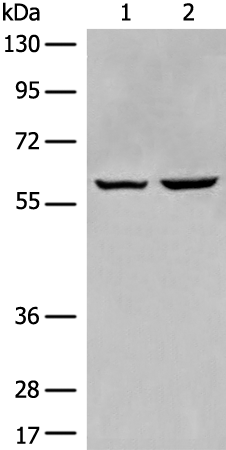
| WB | 咨询技术 | Human,Mouse,Rat |
| IF | 咨询技术 | Human,Mouse,Rat |
| IHC | 咨询技术 | Human,Mouse,Rat |
| ICC | 技术咨询 | Human,Mouse,Rat |
| FCM | 咨询技术 | Human,Mouse,Rat |
| Elisa | 1/5000-1/10000 | Human,Mouse,Rat |
| Aliases | COE2; OE-3; EBF-2; O/E-3 |
| WB Predicted band size | 63 kDa |
| Host/Isotype | Rabbit IgG |
| Antibody Type | Primary antibody |
| Storage | Store at 4°C short term. Aliquot and store at -20°C long term. Avoid freeze/thaw cycles. |
| Species Reactivity | Human, Mouse |
| Immunogen | Synthetic peptide of human EBF2 |
| Formulation | Purified antibody in PBS with 0.05% sodium azide and 50% glycerol. |
+ +
以下是关于EBF2抗体的3篇示例文献(内容为示例性概括,具体文献需根据实际研究补充):
---
1. **文献名称**:*EBF2 regulates osteoblast-dependent differentiation of brown adipocytes*
**作者**:Wang, H. et al.
**摘要**:本研究通过EBF2抗体进行免疫印迹和免疫荧光实验,发现EBF2在棕色脂肪细胞分化中与成骨细胞信号通路相互作用,揭示了其在代谢调控中的双重功能。
2. **文献名称**:*EBF2 expression in neural crest development*
**作者**:Smith, J.R. & García-Castro, M.I.
**摘要**:利用EBF2抗体的免疫组化分析,揭示了EBF2在神经嵴细胞迁移和分化中的时空表达模式,提示其对颅面发育的关键调控作用。
3. **文献名称**:*EBF2 as a biomarker in aggressive breast cancer subtypes*
**作者**:Chen, L. et al.
**摘要**:通过EBF2抗体检测临床样本,发现EBF2在三阴性乳腺癌中高表达,并与肿瘤侵袭性相关,提示其作为潜在治疗靶点的价值。
---
如需具体文献,建议在PubMed或Google Scholar中以“EBF2 antibody” + 研究领域(如“adipogenesis”“cancer”)为关键词检索。
The EBF2 antibody targets Early B-Cell Factor 2 (EBF2), a transcription factor belonging to the Collier/Olf/EBF (COE) family. EBF2 plays critical roles in cellular differentiation and tissue development, particularly in the nervous system, adipose tissue, and immune cells. While its paralog EBF1 is well-studied in B-cell maturation, EBF2 is increasingly recognized for its involvement in neurodevelopment, including neuronal subtype specification, synaptic plasticity, and midbrain dopaminergic neuron maintenance. It also regulates adipogenesis and metabolic processes by interacting with key signaling pathways like Wnt and BMP.
In research, EBF2 antibodies are essential tools for detecting protein expression, localization, and interactions in models of neurodevelopmental disorders, obesity, and cancer. Studies suggest EBF2 acts as a tumor suppressor or oncogene depending on context, with roles in leukemia, neuroblastoma, and glioblastoma. Commercially available EBF2 antibodies include monoclonal and polyclonal variants validated for techniques like Western blotting, immunohistochemistry, and ChIP-seq. Species reactivity typically covers human, mouse, and rat samples. Recent advances highlight its therapeutic potential, driving demand for high-specificity antibodies to explore EBF2's regulatory networks and disease associations. Validation via knockout controls remains crucial due to homology with other COE family members.
×